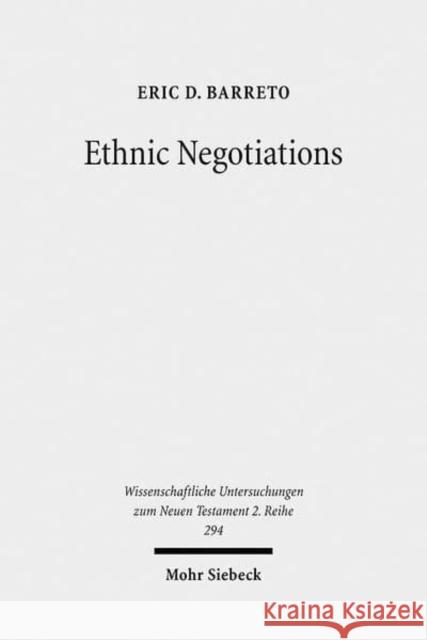Ethnic Negotiations: The Function of Race and Ethnicity in Acts 16 » książka
Ethnic Negotiations: The Function of Race and Ethnicity in Acts 16
ISBN-13: 9783161506093 / Angielski / Miękka / 2010 / 221 str.
Biblical scholarship has recently begun to explore the complex notions of race and ethnicity. Focusing on Acts 16, Eric D. Barreto inquires as to the function of ethnic identities in Luke's composition. The current study of Acts curtails a full appreciation of Luke's expansive theological vision by either neglecting racial and ethnic categories or construing them as relatively static designations. Instead, race and ethnicity were theologically vital yet flexible notions in Acts. Luke does not imagine the creation of a new ethnicity of Christians; instead, he projects an interstitial ethnic space between the competing and overlapping ethnic claims of Jews, Romans, Greeks, and the other peoples that populate the pages of Acts. Luke does not erase ethnic difference but employs the flexible bounds of ethnicity in order to illustrate the wide reach of the early church movement.
Biblical scholarship has recently begun to explore the complex notions of race and ethnicity. Focusing on Acts 16, Eric D. Barreto inquires as to the function of ethnic identities in Luke's composition. The current study of Acts curtails a full appreciation of Luke's expansive theological vision by either neglecting racial and ethnic categories or construing them as relatively static designations. Instead, race and ethnicity were theologically vital yet flexible notions in Acts. Luke does not imagine the creation of a new ethnicity of Christians; instead, he projects an interstitial ethnic space between the competing and overlapping ethnic claims of Jews, Romans, Greeks, and the other peoples that populate the pages of Acts. Luke does not erase ethnic difference but employs the flexible bounds of ethnicity in order to illustrate the wide reach of the early church movement.











